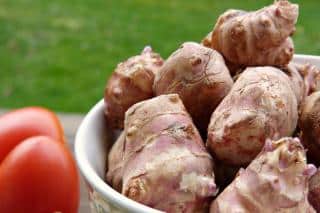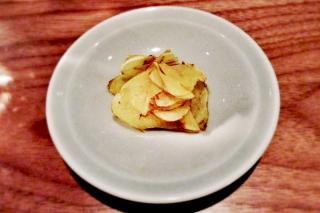

Jerusalem artichoke or Helianthus tuberosus belongs to the same family as endive, lettuce and sunflower: the Asteraceae family.
There are several Jerusalem artichoke varieties. Depending on the variety, the color of the root changes. It can be white or yellow, or even pink and purple, like the ‘Rouge du Limousin’ or the ‘Violet de Rennes’.
This root-vegetable can be eaten from November to April. In Europe, Jerusalem artichoke production is mainly grown in France, Germany and the Netherlands.
It’s also called the “winter artichoke”, “earth pear”, “sunchoke” and also “Canadian truffle”. Discover this delicious root vegetable which is such a boon to our body’s health.
Get to know this delicious root vegetable, and its many benefits for our health and body.
In French, the vegetable is called “topinambour”, which, curiously, is named after a Brazilian tribe called the “Tupinambas”.
Jerusalem artichoke is actually native to North America.
The explorer Samuel de Champlain brought the plant over from Canada in the XVIIth century.
During the Second World War, Jerusalem artichoke was a staple food that replaced potatoes which were requisitioned by the German occupants.
After the war, people spurned these spuds and didn’t want to eat of them anymore because they were connected to a time of dire need and rationing.
Today, this vegetable is making a comeback in our diets, which our tastebuds can only be grateful for.
Jerusalem artichoke is excellent for intestinal transit. This very effective food helps digestion and regulates intestinal transit in case of constipation.
 Moreover, the very high amounts of inulin, which is a polysaccharide often present in plants. This compound eliminates noxious bacteria that sometimes live in the colon. Actually, it protects the good bacteria that are part of our intestinal flora and are beneficial when defending the body.
Moreover, the very high amounts of inulin, which is a polysaccharide often present in plants. This compound eliminates noxious bacteria that sometimes live in the colon. Actually, it protects the good bacteria that are part of our intestinal flora and are beneficial when defending the body.
Jerusalem artichoke contributes to weight loss thanks to this inulin. Jerusalem artichoke is an excellent appetite suppressant. It quickly leads the stomach to signal that it’s full, and thus whisks away the desire to overeat or snack.
It reduces bad cholesterol levels and supports good cholesterol. Thus, it preserves our arteries and limits appearance of cardiovascular diseases.
Jerusalem artichoke is an excellent disinfectant.
Jerusalem artichoke provides many trace elements: magnesium 17 mg/ 3.5 oz (100 g) and calcium 14 mg/ 3.5 oz (100 g) for health and bone structure. That’s why Jerusalem artichoke offsets osteoporosis so well.
It also carries iron which is excellent to promote the flow of oxygen in the blood and inside body cells. It helps fight against anemia.
There’s potassium as well, 429 mg / 3.5 oz (100 g), which regulates arterial blood pressure, muscle contraction and transmission of nervous impulses.
And also phosphorus 78 mg/ 3.5 oz (100 g), and sodium 4mg/ 3.5 oz (100 g).
The vitamin C that appears in Jerusalem artichoke is a powerful antioxidant that protects our bodies from free radicals, from cellular ageing since it stimulates the immune system.
Jerusalem artichoke also contains smaller amounts of B group vitamins and pro vitamin A.
It’s recommended for nursing mothers since it speeds milk production.
Precautions: Jerusalem artichoke might cause flatulence and stomach trouble. Some persons aren’t able to digest it well.
It imparts 4 times less calories than potatoes. This is the perfect vegetable for your weight-loss diet.
Since its glycemic index is so low (15), Jerusalem artichoke can be included directly to the diets of diabetic persons. Indeed, it won’t lead to that disruptive glycemia spike (glucose levels in the blood).
 The taste is quite similar to that of artichoke, which is why the name “artichoke” stuck to the plant.
The taste is quite similar to that of artichoke, which is why the name “artichoke” stuck to the plant.
The flowers are edible and can be added to mixed salads.
 In mixed salads, Jerusalem artichoke is supreme with corn salad and lemon-spiked salad dressing.
In mixed salads, Jerusalem artichoke is supreme with corn salad and lemon-spiked salad dressing.
Sauteed in a pan, Jerusalem artichoke will side well with meat.
And fans will definitely adore preparing pickled sunchoke!
<!–silent
Try the many Jerusalem artichoke recipes here at Nature-and-Garden.
–>
This fragile vegetable only keeps for a few days in the vegetable rack in your refrigerator.
Peeling tip: the “twisted” shape of this root makes peeling Jerusalem artichoke a bit difficult. To make it easier, boil or cook the Jerusalem artichoke with its skin together. Once cooked, it will peel off very easily.
Living deep in the Dandenong Ranges, Melbourne Victoria, I face the challenge of cultivating in grounds that get full sun thus my focus of late has been mushroom growing .
This year as a result of limiting the diversity of edibles in small veggie garden to varieties of potatoes and the white Jerusalem artichoke.
I’m looking forward to planting the other colours especially purple. Word goes out to any local growers in the Mt Dandenon area 🕉
Hi Bass-Tone, for sure, planting is as much about knowing what to grow as it is to know how to care for it. Hopefully you’ll find those interesting varieties!